|
De Franse schrijver Philippe Sollers werd geboren op 28 november 1936 in Bordeaux. Zie ook mijn blog van 28 november 2008 en ook mijn blog van 28 november 2009.xml:namespace prefix = o ns = "urn:schemas-microsoft-com:office:office" />
Uit: Un vrai roman. Mémoires
(François Mauriac)
Il écrit son «Bloc-Notes» assis sur un petit lit, Mauriac, papier sur ses genoux, à l'écoute. Il est incroyablement insulté à longueur de temps, et il y répond par des fulgurations et des sarcasmes (ressemblance avec Voltaire, après tout). Il est très drôle. Méchant? Mais non, exact. Sa voix cassée surgit, très jeune, la flèche part, il se fait rire lui-même, il met sa main gauche devant sa bouche. Homosexuel embusqué ? On l'a dit, en me demandant souvent, une lueur dans l'il, si à mon égard, etc. Faribole. Mauriac était très intelligent et généreux, voilà tout. Fondamentalement bon. Beaucoup d'oreille (Mozart), une sainte horreur de la violence et de sa justification, quelle qu'elle soit. Les sujets abordés, après les manipulations, les mensonges et les hypocrisies de l'actualité? Proust, encore lui, et puis Pascal, Chateaubriand, Rimbaud. Les écrivains sont étranges: avec Ponge, je suis brusquement contemporain de Démocrite, d'Epicure, de Lautréamont, de Mallarmé. Avec Mauriac, de saint Augustin, des «Pensées», d'«Une saison en enfer».
(...)
(Alain Robbe-Grillet)
Dans les péripéties malheureuses et confuses entre cinéma et littérature, l'échec le plus révélateur est quand même celui de Robbe-Grillet. Au début du «nouveau roman», il écrit contre toute image «la Jalousie», ascèse ennuyeuse mais intéressante. Ensuite, il veut filmer ses fantasmes érotiques, et c'est le kitsch. Une telle bouffée de laideur méritait bien une élection à l'Académie française.
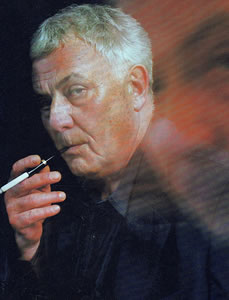
Philippe Sollers (Bordeaux, 28 november 1936)
De Surinaamse schrijver, dichter en jurist Hugo Pos werd geboren in Paramaribo op 28 november 1913. Zie ook mijn blog van 28 november 2008 en ook mijn blog van 28 november 2009.
Uit: In Triplo. Op weg naar Tokio I
Ik bevond mij in Tarakan toen Japan op 15 augustus 1945 capituleerde en kreeg de opdracht om me per vliegtuig naar Brisbane te begeven. Vandaar zou het eerste schip met de omineuze naam de Van Heutz met een paar honderd militairen en burgerpersoneel naar Java vertrekken. Dat vertrek ging met een paar moeilijkheden gepaard, omdat de Australische havenarbeiders na het uitroepen van de Republiek door Soekarno weigerden Nederlandse schepen te laden. Omdat staken in Australië zelfs tijdens de oorlog een veel voorkomend verschijnsel was werd dat nogal gelaten opgevat. Het betekende wel dat het schip door de troepen zelf moest worden geladen. Ondanks deze vertraging begaven we ons welgemoed aan boord. Onder de passagiers bevond zich ook kolonel Spoor, toen nog geen generaal, het hoofd van de nefis, de militaire inlichtingendienst. Die dienst was blijkbaar beter op de hoogte van de situatie in de buitengewesten dan van die op Java, waar ze tijdens de oorlog geen voet aan de grond heeft kunnen krijgen. In ieder geval begon de luchthartige stemming aan boord om te slaan toen de radioberichten vanuit Batavia steeds verontrustender luidden. In plaats van een hartelijk welkom voor de bevrijders van Indië - en dat waren we toch - moesten we op een vijandige ontvangst rekenen.
Dat laatste viel nogal mee. In Tandjong Priok, waar we op 4 oktober aankwamen, wapperden weliswaar overal de roodwitte vlaggen van de Republiek op de daken, maar er werd niet op ons geschoten. De verwarring in Batavia-Djakarta was groot, het rood-wit en het rood-wit-blauw gaven aan welke gebouwen al dan niet door de aanhangers van de Republiek bezet waren.
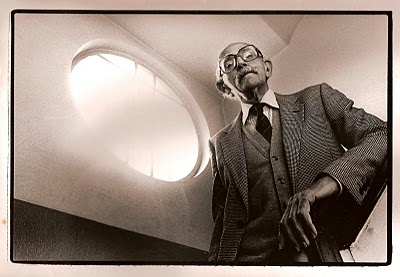
Hugo Pos (28 november 1913 - 11 november 2000)
De Oostenrijkse schrijver Stefan Zweig werd op 28 november 1881 in Wenen. Zie ook mijn blog van 28 november 2006 en ook mijn blog van 28 november 2008 en ook mijn blog van 28 november 2009.
Uit: Der Partner
Die Lokomotive schrie heiser auf: Der Semmering 1 war erreicht. Eine Minute rasteten die schwarzen Wagen im silbrigen Licht der Höhe, warfen ein paar bunte Menschen aus, schluckten andere ein, Stimmen gingen geärgert hin und her, dann schrie vorne wieder die heisere Maschine und riss die schwarze Kette rasselnd in die Höhle des Tunnels hinab. Rein ausgespannt, mit klaren, vom nassen Wind reingefegten Hintergründen lag wieder die hingebreitete Landschaft.
Einer der Angekommenen, jung, durch gute Kleidung und eine natürliche Elastizität des Schrittes sympathisch auffallend, nahm den andern rasch voraus einen Fiaker zum Hotel. Ohne Hast trappten die Pferde den ansteigenden Weg. Es lag Frühling in der Luft. Jene weißen, unruhigen Wolken flatterten am Himmel, die nur der Mai und der Juni hat, jene weißen, selbst noch jungen und flattrigen Gesellen, die spielend über die blaue Bahn rennen, um sich plötzlich hinter hohen Bergen zu verstecken, die sich umarmen und fliehen, sich bald wie Taschentücher zerknüllen, bald in Streifen zerfasern und schließlich im Schabernack den Bergen weiße Mützen aufsetzen. Unruhe war auch oben im Wind, der die mageren, noch vom Regen feuchten Bäume so unbändig schüttelte, dass sie leise in den Gelenken krachten und tausend Tropfen wie Funken von sich wegsprühten. Manchmal schien auch Duft vom Schnee kühl aus den Bergen herüberzukommen, dann spürte man im Atem etwas, das süß und scharf war zugleich. Alles in Luft und Erde war Bewegung und gärende Ungeduld. Leise schnaubend liefen die Pferde den jetzt niedersteigenden Weg, die Schellen klirrten ihnen weit voraus.
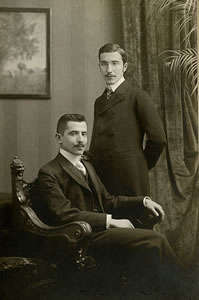
Stefan Zweig (28 november 1881 22 februari 1942)
Hier staande, met zijn broer Alfred, Wenen, 1900
De Engelse schrijfster Nancy Mitford werd geboren op 28 november 1904 in Londen. Zie ook mijn blog van 28 november 2008 en ook mijn blog van 28 november 2009.
Uit: Love in a Cold Climate
I am obliged to begin this story with a brief account of the Hampton family, because it is necessary to emphasise the fact once and for all that the Hamptons were very grand as well as very rich. A short session with Burke or with Debrett would be quite enough to make this clear, but these large volumes are not always available, while the books on the subject by Lord Montdores brother-in-law, Boy Dougdale, are all out of print. His great talent for snobbishness and small talent for literature have produced three detailed studies of his wifes forebears, but they can only be read now by asking a bookseller to get them at second hand. (The bookseller will put an advertisement in his trade paper, The Clique: H. Dougdale, any by. He will be snowed under with copies at about a shilling each and will then proudly inform his customer that he has managed to find what you want, implying hours of careful search on barrows, dirt cheap, at 30/- the three.) Georgiana Lady Montdore and Her Circle, The Magnificent Montdores and Old Chronicles of Hampton, I have them beside me as I write, and see that the opening paragraph of the first is:
Two ladies, one dark, one fair, both young and lovely, were driving briskly towards the little village of Kensington on a fine May morning. They were Georgiana, Countess of Montdore and her great friend Walburga, Duchess of Paddington, and they made a delightfully animated picture as they discussed the burning question of the hourshould one or should one not subscribe to a parting present for poor dear Princess Lieven?
This book is dedicated, by gracious permission, to Her Royal Highness, the Grand Duchess Peter of Russia, and has eight full-page illustrations.
It must be said that when this trilogy first came out it had quite a vogue with the lending-library public.
The family of Hampton is ancient in the West of England, indeed Fuller, in his Worthies mentions it as being of stupendous antiquity.
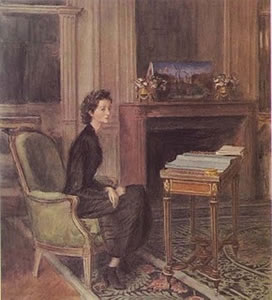
Nancy Mitford (28 november 1904 30 juni 1973)
Portret door Mogens Tvede
De Amerikaanse schrijfster Dawn Powell werd geboren op 28 november 1896 in Mount Gilead, Ohio. Zie ook mijn blog van 28 november 2008 en ook mijn blog van 28 november 2009.
Uit: The Golden Spur
Only eighteen hours in New York, and he loved everything, every inch of it. Ah, the square! He crossed Waverly and stood at the corner by the playground. He beamed at the ferociously determined child aiming a scooter straight at him, and jumped out of the way of a chain of girl roller-skaters advancing rhythmically toward him. An enormous-busted, green-sweatered girl with a wild bush of hair, black skin-tight pants outlining thick thighs and mighty buttocks, came whooping along, clutching the legs of a screaming bearded young man she bore on her shoulders.
"Let me down, now! Now you let me down!" he yelled, waving his arms. A short muscular girl with ape face and crew-cut, in stained corduroy shorts and red knee socks, ran behind, shouting with laughter.
"Didn't I tell you that Shirley is the strongest dyke in Greenwich Village?"
The big gorilla girl stopped abruptly, letting the young man fall headlong over her shoulders and sprawl crabwise over the green.
"Don't you dare call me a dyke!" she shouted, shaking the smaller girl by the shoulders.
The lad snatched the moment to pick himself up, with a sheepish grin at Jonathan, and tore down the street, combing his long, sleek locks as he ran.
"Go ahead, Shirley, pick up this one, go ahead!" the small girl yelled, pointing at Jonathan while she wriggled neatly out of her attacker's hands. Too startled to move for a few seconds, Jonathan saw the big girl's eye fall on him with a speculative smile. He clutched his briefcase and ran, the girls howling behind him. He made for the fenced-in space where the smallest kiddies, drunk with popsicles, were wobbling on teeter-totters or reeling behind their buggies. He knocked one of these live dolls over and quickly snatched it up in his arms as Big Shirley came toward him.
"Look out, he's going to throw the kid at you, Shirley!" the short girl yelled warning. "Come on, let's go."
They loped away, stopping for the younger ape to leap expertly onto Shirley's back. With a sigh of relief, Jonathan set down the howling child carefully.
"Thank you very much, sir," he said to the child, picking up the raspberry Good Humor his savior had dropped and restoring it to the open red mouth. He remembered that he hadn't had anything to eat since last night's hamburger in the station and he was ravenous. A benign white-haired old gentleman, wide-brimmed black hat on lap, black ribbons fluttering from his spectacles, sat on a bench reading a paperback copy of The Dance of Life. Reassured by the title, Jonathan coughed to get his attention.
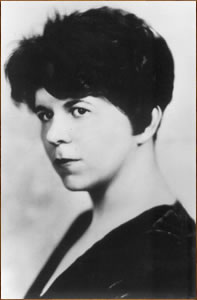
Dawn Powell (28 november 1896 14 november 1965)
|



